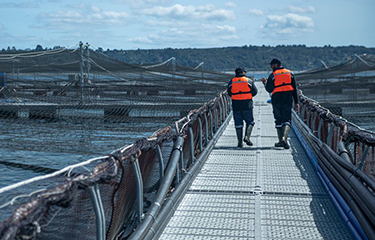Chile’s salmon industry is once again on the defensive against a documentary as a new Greenpeace production has launched calling for an end to salmon farming in the Kawésqar National Reserve.
Greenpeace Chile launched the documentary, “Por Aquí No” (“Not Here”), on 28 September in theaters, with a T.V. debut on 6 October on the History Channel. The new documentary stars well-known local actors Benjamín Vicuña and Carolina Arregui as they visit the Kawésqar National Reserve, located in the Magallanes Region in the Chilean Patagonia. The NGO said the new film is meant to raise awareness of the need to protect the area from development by the salmon-farming industry.
“Hopefully, with this campaign, people will become aware and we will be able to prohibit the installation of salmon farming in the waters of the Kawésqar National Reserve," Arregui said in a Greenpeace release. "It is important that these wonderful seas are protected so that there are no more salmon projects in a place that houses a wonderful habitat of species unique in the world."
The Kawésqar National Park extends over 2.8 million hectares, making it the second-largest park in Chile. However, the coastal areas in the park are considered a national reserve, a category that has less protection than a park. The reserve is home to 67 salmon-farming concessions, with an additional 64 concession requests currently pending, Greenpeace reported, which it said “is a great example of diverse Patagonian ecosystems threatened by the industry.”
“Stopping industry expansion prevents the irreversible impact on nature and the environment, as well as on local activities such as artisanal fishing and tourism,” Greenpeace Chile National Director Matías Asun said. “With this documentary, we want the waters of the current Kawésqar National Reserve to be included within the Kawésqar National Park, so that no more salmon farming projects be approved in the current Kawésqar National Reserve and that the expansion of the industry in Chilean Patagonia be put to an immediate stop.”
Asun also called for a halt to salmon farming in Patagonia in general.
The new documentary is the second this year calling for an end to salmon farming in Kawésqar National Reserve. A documentary by National Geographic that debuted in March 2022 made similar calls.
Chile’s Salmon Council said in a statement the movie makes several false claims and criticized hyperbolic statements made in the film. The council, which brings together the companies AquaChile, Australis, Cermaq, Mowi, and Salmones Aysén, together representing more than half of Chilean salmon production by volume, denounced the movie as grossly misleading.
The documentary says the salmon-farming industry "shamelessly annihilates natural resources," but the Salmon Council responded that salmon farming does not extract resources; Rather, it sows, cultivates, and harvests them.
“This activity has coexisted for decades with fishing and crustacean farming, without these having been affected by salmon farming. In addition, it is a productive sector that is highly regulated and constantly monitored from an environmental and health perspective,” the council said in a release.
The documentary also claims that Chile's salmon-farming industry occupies places until they are too degraded to be used commercially, but the concessions in which aquaculture takes place are established in specific places determined by the government authorities, the council said. Furthermore, companies do not abandon their farms, but rather allow for resting periods in which they suspend operations for a few months.
"Many concessions granted in the early years [of the industry] are still operating without any inconvenience," it said.
Furthermore, the presence of the salmon industry in the area of the preserve predates the creation of Kawésqar National Park. The council the salmon farming concessions in the Kawésqar reserve only represent 0.12 percent of its maritime space.
“In fact, the state of Chile delivered the aquaculture concessions a decade before the creation of the reserve, and two decades before the areas appropriate for aquaculture were defined," it said. “Eradicating concessions from reserves means severely limiting the options for progress and employment in aquaculture regions, attacking the productive chain composed of thousands of [businesses] and families and reducing opportunities for their residents."
The documentary claims that salmon farming in the Kawésqar reserve is only possible via a legal loophole. However, the council said Chile's General Fisheries Law (Article 158, in force since 2002) establishes categories with different levels of protection and, in some of them, it is possible to reconcile environmental care with the different productive activities and the economic progress of the surrounding population.
The documentary also claims it takes two to three kilos of other fish to raise one kilo of salmon, which the Salmon Council denounced as false. Chilean salmon have an average feed-conversion rate of 1.2:1. In addition, the amount of ingredients coming from other fish in salmon feed has decreased drastically, falling from close to 80 percent in the 1990s to about 12 percent today.
The organization called for “fruitful dialog with accurate, balanced information that allows us to inform and show reality, without bias, while also considering the significant progress that Chilean salmon farming has had in recent decades in terms of sustainability and the constructive relationship that many Kawésqar communities and artisanal fishing have with the industry.”
Chile President Gabriel Boric, who was elected in December 2021 and who took office in March 2022, has also questioned the environmental sustainability of the industry and is reportedly considering a moratorium on the farmed salmon sector that would halt its expansion in the country.
Chilean trade body SalmonChile declined to comment when contacted by SeafoodSource.
Photo courtesy of the Chilean Salmon Council







